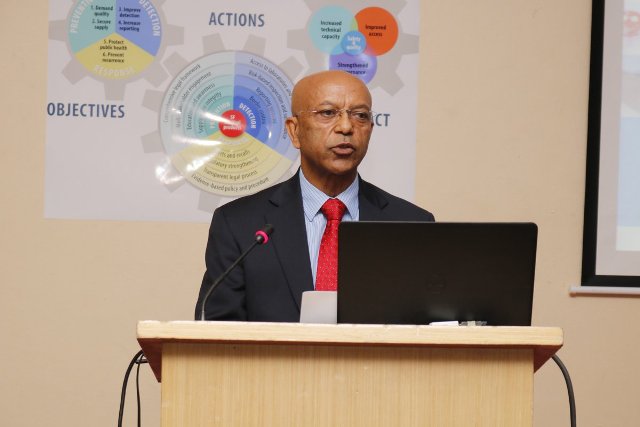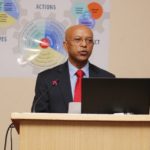By Asmau Ahmad
The World Health Organisation (WHO) says it is seeking the support of the public and private sectors to improve the performances of the National Tuberculosis Control Programmes.
WHO Country Representative, Nigeria, Dr Wondimagegnehu Alemu, said the organization was concerned that Tuberculosis (TB), an infection caused by bacteria (Mycobacterium tuberculosis), continued to be a global threat with 11 million people developing the disease yearly.
Alemu said this at a summit themed: “Public Private Mix (PPM) Summit for Tuberculosis Control in Nigeria,” on Tuesday in Lagos, organised in collaboration with the Federal Ministry of Health and Lagos State Ministry of Health. TB, which mostly affects the lungs, is spread from person to person through the air. When people with lung TB cough, sneeze or spit, they propel the TB germs into the air; and a person needs to inhale only a few of these germs to become infected.
According to the 2017 Global TB report, Nigeria is among the 14 high burden countries for TB, TB/HIV and MDR-TB, ranking 7th among the 30 high TB burden countries and 2nd in Africa. It is also estimated that every hour, 47 Nigerians develop active TB, of which seven are children, and that every hour, 18 Nigerians die of TB which is preventable, treatable and curable.
Alemu said: “The burden of the disease in Nigeria is further fuelled by the huge number of undetected TB cases, which we call, missing cases. “These serve as pool of reservoir for the continuous transmission of the disease as each undetected TB case has the potential of infecting 10-15 person in a year. “Nigeria is also among the 10 countries that accounted for 64 per cent of the global gap in missing Tb cases.
“Consequently, there is need to find the remaining 300,000 cases, which are still missed by the health sector (of the total 400,000 only 100 cases were reported).” To achieve this feat, he said there was need for quality TB diagnostic coverage nationwide. “Also, increased awareness of the general public about TB so that they report to health facilities when they experience the cardinal signs of chronic cough, increasing involvement of private sector in TB control is required,” Alemu said.
Lagos State Commissioner for Health, Dr Jide Idris, said TB was declared a global emergency by WHO in 1993. “A third of the world’s population, 2/4 billion, is infected with TB and on a daily basis worldwide, 26,000 people come down with TB disease with 41,000 deaths.
“Toward effective control of TB, the Lagos State TB Control Programme was established in 2003 with 11 TB treatment (DOTS) centres, covering only six of the 20 LGAs. “This by all standards was grossly inadequate for proper access of TB services. “The focus of the programme has, therefore, been establishment of additional service points (called DOTS expansion).“By 2006, the state programme had established 35 more DOTS centres bringing the total to 46 and covering all the state’s LGA.
“At the moment, we have 926 TB treatment centres covering all 57 LGA/LCDAs, 108 TB microscopy and 30 GeneXpert sites with at least 1 (one) GeneXpert machine in each of the 20 LGAs,” Idris said. He explained that with the support of partners, various active case finding activities were going on, including house-to-house case search by community TB workers, tracing of contacts of diagnosed TB cases and sensitisation during outreaches.
On the challenges of TB control, Idris identified funding as being critical. “There are huge resources in the private sector and we wish to tap into some of these to drive TB from our country. “Today, 65 per cent of our 926 DOTS centres are private health facilities; in the immediate past quarter (Q2), 15.5 per cent of cases registered with the Lagos State TB Control Programme were from these private facilities.
“The key areas where supports are required from PPP mix toward fast-tracking TB Control include sponsoring of communication materials and programmes for awareness creation. “Others include procuring additional GeneXpert machines to aid TB diagnosis and adopting DOTS Centres,” Idris said.
Dr Adebola Lawanson, National Cordinator, National TB, Leprosy, Buruli, Ulcer Control Programme, said the major challenge in TB control, testing and treatment remained funding. According to her, low coverage of TB services (Prevention, diagnosis, treatment and care), Inadequate Patient support and anti-TB medicines were also challenges.
Also, Prof. Lovett Lawson, Board Chair, Stop TB Partnership Nigeria, said the FMoH in collaboration with state ministries of health and TB stakeholders/partners currently provided TB services across the country in public and private health facilities. According to him, this effort has a treatment coverage rate of 25 per cent. “This low treatment coverage rate is due to the inadequate resources available for the control of TB in the country.
“Also, 64 per cent of the national TB budget is unfunded in 2017, low awareness of the early signs and symptoms of TB among the general public in Nigeria are all challenges. “We urge organisations and companies with CSR programme to support efforts to end TB in Nigeria “We advocate for sustainable and predictable domestic funding for TB programmes in Nigeria.
“These are necessary because anyone can contact TB anywhere and anytime; at most, it only requires the cough or sneeze of an infected person,’’ Lawson said.



